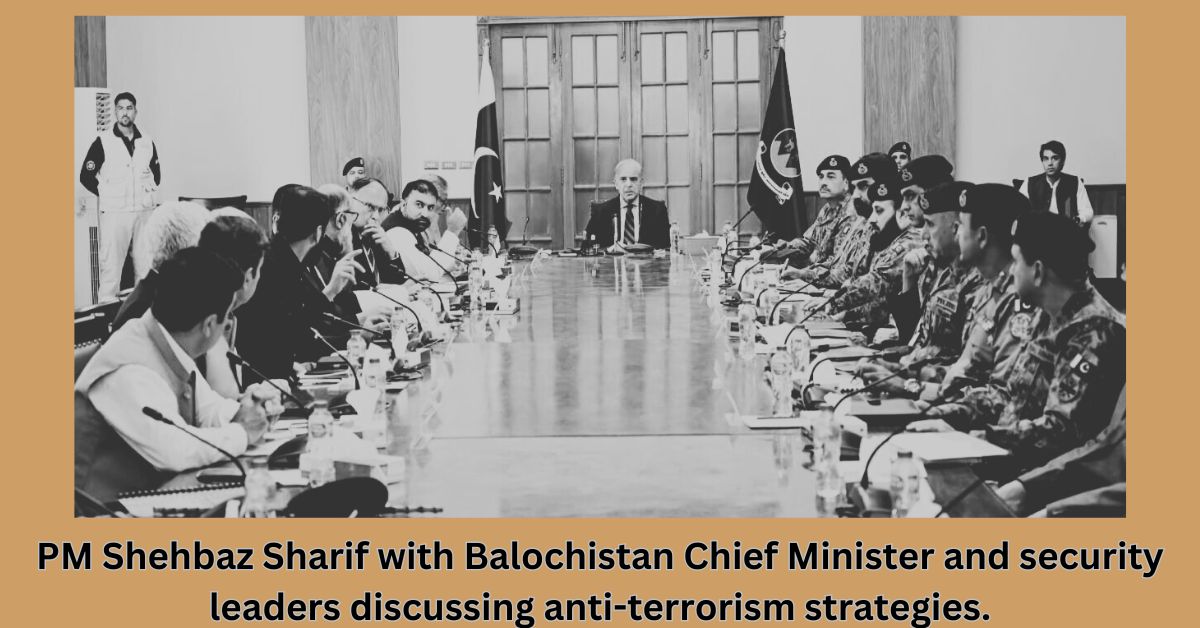
Prime Minister Shehbaz Sharif Addresses Terrorist Attacks in Balochistan
On his visit to Quetta, Prime Minister Shehbaz Sharif condemned the recent terrorist attacks in Balochistan, labeling them a “heinous plan” by militants. The Prime Minister’s visit comes in the wake of a series of violent incidents across the province, orchestrated by the outlawed Balochistan Liberation Army (BLA), a separatist group. These attacks, which took place around midnight on Sunday, resulted in tragic losses, including the deaths of at least 50 people, with 14 security personnel among the victims.
The militants’ brutal tactics, such as targeting police stations, blowing up railway tracks, and torching vehicles, have led to widespread chaos and fear across the province. In response, security forces acted swiftly, neutralizing 21 militants. Among the deceased were 23 individuals in Musa Khel, mostly laborers from Punjab, who were tragically killed after being removed from their vehicles.
Government’s Response to the Crisis
Prime Minister Shehbaz Sharif chaired a high-level meeting of the Provincial Apex Committee of the National Action Plan (NAP) upon his arrival in Quetta. The meeting, attended by key figures such as Army Chief General Asim Munir and Balochistan Chief Minister Sarfraz Bugti, focused on assessing the security situation and formulating a robust response to the escalating violence.
The Prime Minister stressed the importance of a united front against terrorism, urging all stakeholders to work together with determination and resolve. He emphasized that the recent incidents have caused deep concern among Pakistanis nationwide, highlighting the need for a comprehensive strategy to combat terrorism.
Strategic Initiatives and Security Enhancements
To strengthen the province’s security framework, Prime Minister Shehbaz Sharif announced the deployment of all police and civil officers of the 48th Joint Group to Balochistan. This move aims to ensure peace, stability, and development in the region by assigning talented and capable officers to various districts and divisions. The initiative is part of a broader policy to bolster Balochistan’s security infrastructure, with officers receiving additional incentives for their commitment to service in the province.
Furthermore, the Prime Minister outlined plans for rotating deployments of officers every six months to maintain a dynamic and adaptive security presence. These strategic initiatives underscore the federal government’s commitment to eradicating terrorism and fostering development in Balochistan.
Call for Unity and Resilience Against Terrorism
Prime Minister Shehbaz Sharif also addressed the possibility of negotiations with militants, clarifying that dialogue is only feasible with those who respect the constitution and acknowledge Pakistan’s sovereignty. He underscored the nation’s duty to combat anti-state elements and reiterated that there is “no room for weakness” in the fight against terrorism.
The Prime Minister’s message was clear: unity and resilience are essential to overcoming the challenges posed by terrorism. He called on Baloch leaders and communities to collaborate in eradicating the scourge of violence, emphasizing that Gwadar port’s development and the success of the China-Pakistan Economic Corridor (CPEC) are crucial for Balochistan’s and Pakistan’s prosperity.
International and Regional Implications
The terrorist attacks in Balochistan have broader implications for regional stability and international relations. The province’s strategic location, bordering Afghanistan and Iran, makes it a focal point for geopolitical dynamics. The resurgence of violence could strain Pakistan’s diplomatic efforts and impact its relations with neighboring countries.
To counter these challenges, the government is engaging with international partners to seek support and cooperation in addressing terrorism. Strengthening cross-border intelligence-sharing and enhancing joint counter-terrorism efforts are critical components of Pakistan’s strategy to combat militant activities and ensure regional peace.
Conclusion
The recent terrorist attacks in Balochistan have underscored the need for a comprehensive, multi-faceted approach to security and development in the region. Prime Minister Shehbaz Sharif’s decisive actions and commitment to ending terrorism reflect the government’s resolve to restore peace and stability. As Balochistan continues to face complex challenges, a united effort from all stakeholders, both domestic and international, is essential to achieving lasting security and prosperity.

